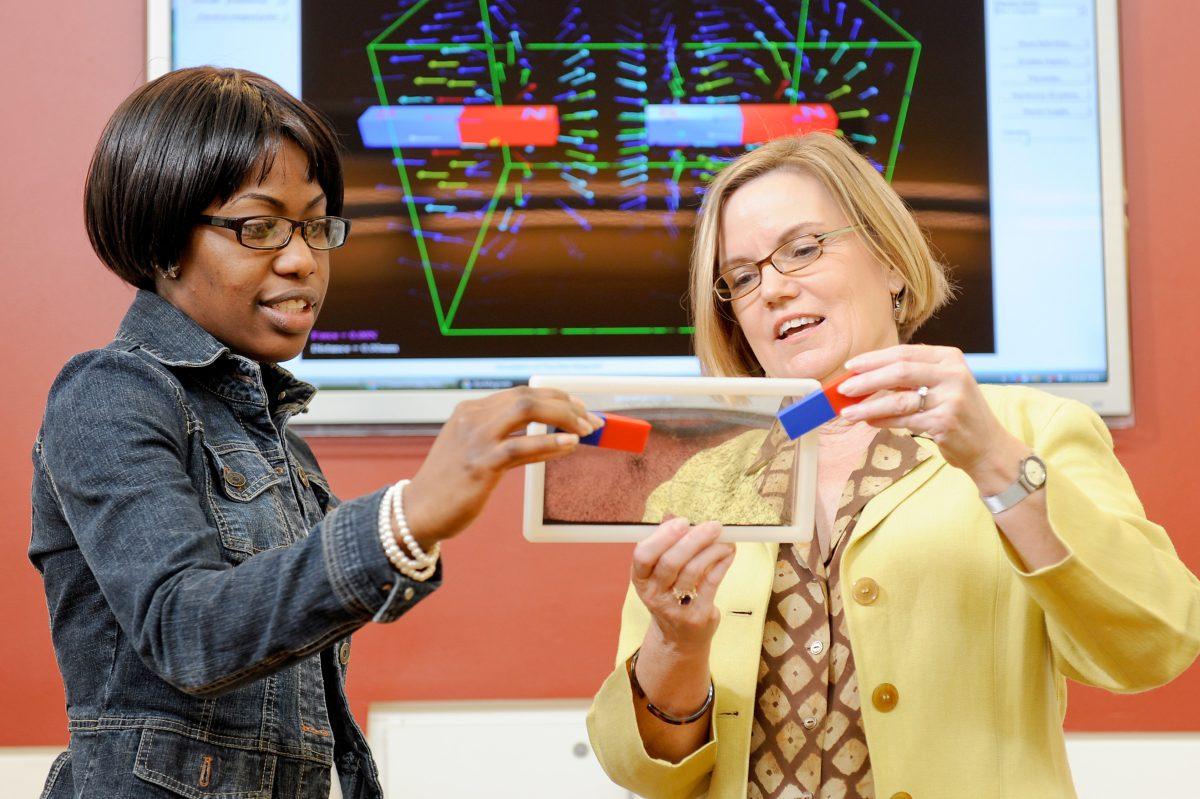
Photo by Becky Kirkland/Courtesy of N.C. State University Communications
Gail Jones shows College of Education students how to work with hands-on materials.
Gail Jones, a professor of science education at N.C. State’s College of Education, is discovering more about what motivates people to pursue science, both as a career and as a hobby.
Her goal is to encourage the next generation to care about science and its role in society.
For Jones, this involves preparing better teachers, helping schools and helping to prepare the next generation for the jobs of the future.
Her current student research involves four partnership middle schools and aims to help students and teachers understand scale as it relates to nanotechnology, according to Jones.
Scale has been identified as one of the big measures that crosses different fields, which is why it is so important for the next generation to understand, Jones said.
Jones is tracking the students over a span of multiple years to see if there is a change in their understanding of scale.
Haptic devices, devices which allow users to interact with a computer by receiving tangible and kinesthetic feedback, have also been a significant part of Jones’ research geared towards increasing scientific interest.
In one study, Jones allowed students to use a tool known as the NanoManipulator, which combined the functions of an Atomic Force Microscope with those of the PHANTOM, a device made by SensAble Technologies that allows users to touch and feel virtual objects.
With this hands-on approach, students were able to feel viruses and other nanosized materials to get an idea about how they are built and how they function. Jones said she has been studying how haptic technology can be used in tandem with 3-D cell technology, which would allow middle school students to gain a better understanding of the way that the animal cell works.
Haptic devices can be used to teach STEM concepts to students in a fun, interactive way while also helping them gain a better understanding of the difficult topics, Jones said.
The other part of Jones’ research is geared towards hobbyists and why they choose not to enter into a career in science. According to Jones, these people have the knowledge, expertise and interest but choose to spend time on hobbies instead of a career.
Her current study, funded by the National Science Foundation, looks at career choices that science hobbyists have made and how science hobbies develop over time. In addition, the study analyzes how science hobbyists network and how they participate with scientists, as in citizen scientist programs where hobbyists collect data for scientists, for example.
“We want to find what motivates people, what sustains people, and whether there were other people who encouraged them to be scientists,” Jones said.
Jones said she is also interested in why there are a lot of science hobbies without high levels of women and minorities participating in them.
This could be happening because the women’s and minorities’ environments do not support these hobbies, according to Jones. That fact, however, can be changed, Jones said. Her current work aims to find out how to promote people of all different backgrounds to pursue science hobbies, both for their personal fulfillment and for an increase in science citizenship.
The ultimate goal of this research is to encourage the next generation of hobbyists, Jones said.
“Research suggests that science hobbyists tend to be more aware of political issues pertaining to science and to participate in public debates about science,” Jones said. “They are generally more aware of the role of science in society, and are reporting to be active participants when it comes to science. We want this for all of our future citizens.”
Jones said she has always been interested in educating people and has always had a love for science. Jones said she always loved to be outdoors, whether it was to look at wildflowers, go bird-watching, or identify plants. This interest in science eventually led her to become attracted to science education.
Jones is a graduate of N.C. State University. She spent some time at UNC-Chapel Hill before returning to N.C. State, where she has been for more than 10 years.
“N.C. State is an awesome place to be a science instructor because it focuses strongly on how to help the people of North Carolina,” Jones said.